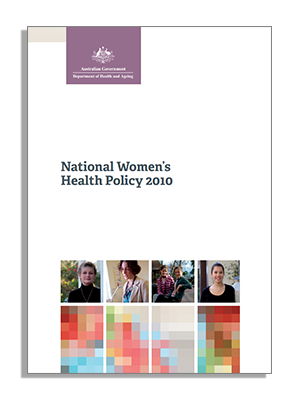2010 National Women’s Health Policy

Policy Superseded
This policy has been replaced by the National Women’s Health Strategy 2020 to 2030.
The Australian Government’s National Women’s Health Policy (2010) was developed as a guide for the next 20 years to improve the health and wellbeing of all women in Australia, especially those at greatest risk of poor health.
Research from the Study is cited extensively in the policy, with evidence from ALSWH contributing to recommendations for women of all ages concerning:
- Sexual and reproductive health (outcomes and risks)
- Mental health, and access to mental health services
- Health behaviours (diet, smoking, alcohol consumption, physical activity)
- Chronic conditions (such as diabetes, heart disease, arthritis)
- Risk factors for depression and anxiety; health outcomes associated with depression and anxiety
- Adherence to healthy behaviour guidelines
- The impact of interpersonal violence and abuse on mental and physical health
- The impact of comorbid conditions on physical and psychological health and social function
Contributing to health recommendations throughout the lifecourse
Young women’s health
ALSWH contributed to recommendations for young women’s health concerning:
- Transitional moments in young women’s lives when health promotion can be targeted
- The impact of social pressure on health issues such as body weight, self-image and risk taking behaviours
- Young women’s aspirations
- Weight gain after pregnancy
Mid-age women’s health
The Study contributed to recommendations for mid-age women’s health concerning:
- Symptoms of menopause
Older women’s health
Contributions were made to recommendations for older women’s health concerning:
- The experience of widowhood and the availability of services to assist with older bereaved women’s health, financial and social needs
- The ability of older women with chronic conditions to manage on their available income
Related Documents
For more information visit: http://www.health.gov.au/womenshealthpolicy

